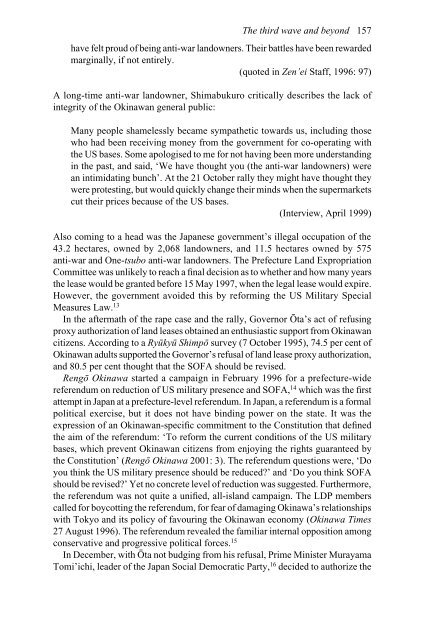Myth, Protest and Struggle in Okinawa
Myth, Protest and Struggle in Okinawa
Myth, Protest and Struggle in Okinawa
Create successful ePaper yourself
Turn your PDF publications into a flip-book with our unique Google optimized e-Paper software.
The third wave <strong>and</strong> beyond 157<br />
have felt proud of be<strong>in</strong>g anti-war l<strong>and</strong>owners. Their battles have been rewarded<br />
marg<strong>in</strong>ally, if not entirely.<br />
(quoted <strong>in</strong> Zen’ei Staff, 1996: 97)<br />
A long-time anti-war l<strong>and</strong>owner, Shimabukuro critically describes the lack of<br />
<strong>in</strong>tegrity of the Ok<strong>in</strong>awan general public:<br />
Many people shamelessly became sympathetic towards us, <strong>in</strong>clud<strong>in</strong>g those<br />
who had been receiv<strong>in</strong>g money from the government for co-operat<strong>in</strong>g with<br />
the US bases. Some apologised to me for not hav<strong>in</strong>g been more underst<strong>and</strong><strong>in</strong>g<br />
<strong>in</strong> the past, <strong>and</strong> said, ‘We have thought you (the anti-war l<strong>and</strong>owners) were<br />
an <strong>in</strong>timidat<strong>in</strong>g bunch’. At the 21 October rally they might have thought they<br />
were protest<strong>in</strong>g, but would quickly change their m<strong>in</strong>ds when the supermarkets<br />
cut their prices because of the US bases.<br />
(Interview, April 1999)<br />
Also com<strong>in</strong>g to a head was the Japanese government’s illegal occupation of the<br />
43.2 hectares, owned by 2,068 l<strong>and</strong>owners, <strong>and</strong> 11.5 hectares owned by 575<br />
anti-war <strong>and</strong> One-tsubo anti-war l<strong>and</strong>owners. The Prefecture L<strong>and</strong> Expropriation<br />
Committee was unlikely to reach a f<strong>in</strong>al decision as to whether <strong>and</strong> how many years<br />
the lease would be granted before 15 May 1997, when the legal lease would expire.<br />
However, the government avoided this by reform<strong>in</strong>g the US Military Special<br />
Measures Law. 13<br />
In the aftermath of the rape case <strong>and</strong> the rally, Governor Ōta’s act of refus<strong>in</strong>g<br />
proxy authorization of l<strong>and</strong> leases obta<strong>in</strong>ed an enthusiastic support from Ok<strong>in</strong>awan<br />
citizens. Accord<strong>in</strong>g to a Ryūkyū Shimpō survey (7 October 1995), 74.5 per cent of<br />
Ok<strong>in</strong>awan adults supported the Governor’s refusal of l<strong>and</strong> lease proxy authorization,<br />
<strong>and</strong> 80.5 per cent thought that the SOFA should be revised.<br />
Rengō Ok<strong>in</strong>awa started a campaign <strong>in</strong> February 1996 for a prefecture-wide<br />
referendum on reduction of US military presence <strong>and</strong> SOFA, 14 which was the first<br />
attempt <strong>in</strong> Japan at a prefecture-level referendum. In Japan, a referendum is a formal<br />
political exercise, but it does not have b<strong>in</strong>d<strong>in</strong>g power on the state. It was the<br />
expression of an Ok<strong>in</strong>awan-specific commitment to the Constitution that def<strong>in</strong>ed<br />
the aim of the referendum: ‘To reform the current conditions of the US military<br />
bases, which prevent Ok<strong>in</strong>awan citizens from enjoy<strong>in</strong>g the rights guaranteed by<br />
the Constitution’ (Rengō Ok<strong>in</strong>awa 2001: 3). The referendum questions were, ‘Do<br />
you th<strong>in</strong>k the US military presence should be reduced?’ <strong>and</strong> ‘Do you th<strong>in</strong>k SOFA<br />
should be revised?’ Yet no concrete level of reduction was suggested. Furthermore,<br />
the referendum was not quite a unified, all-isl<strong>and</strong> campaign. The LDP members<br />
called for boycott<strong>in</strong>g the referendum, for fear of damag<strong>in</strong>g Ok<strong>in</strong>awa’s relationships<br />
with Tokyo <strong>and</strong> its policy of favour<strong>in</strong>g the Ok<strong>in</strong>awan economy (Ok<strong>in</strong>awa Times<br />
27 August 1996). The referendum revealed the familiar <strong>in</strong>ternal opposition among<br />
conservative <strong>and</strong> progressive political forces. 15<br />
In December, with Ōta not budg<strong>in</strong>g from his refusal, Prime M<strong>in</strong>ister Murayama<br />
Tomi’ichi, leader of the Japan Social Democratic Party, 16 decided to authorize the
















